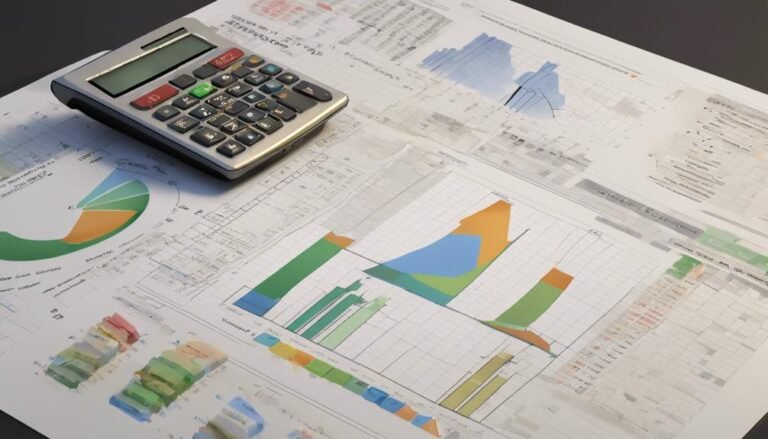Tax Accounting: Understanding Its Impact on Financial Decisions
Understanding tax accounting is essential for informed financial decisions. Tax deductions reduce taxable income, lowering the amount subject to taxation. Tax credits directly reduce the tax owed, providing dollar-for-dollar reductions. Utilize tax-saving techniques like tax credits and maximizing deductions. Stay prepared for tax audits by maintaining accurate records. Tax implications have a substantial impact on financial outcomes. Meticulous attention to detail is vital for tax compliance. Integrate tax-efficient approaches to enhance fiscal decisions and manage tax burdens. By grasping these concepts, you will navigate financial decisions more effectively.
Key Takeaways
- Tax deductions reduce taxable income, lowering the amount subject to taxation.
- Tax credits directly lower the tax owed, offering dollar-for-dollar reductions.
- Understanding tax implications on investments is crucial for financial outcomes.
- Maximize tax deductions to reduce taxes owed and optimize financial decisions.
- Tax-efficient strategies in estate planning help preserve wealth and minimize tax liabilities.
Importance of Tax Accounting
Understanding the importance of tax accounting is crucial for making informed financial decisions. When it comes to taxes, there are two key components that can greatly impact your financial situation: tax deductions and tax credits.
Tax deductions are expenses that you can subtract from your taxable income, thereby reducing the amount of income that's subject to taxation. Common deductions include mortgage interest, charitable contributions, and certain medical expenses.
On the other hand, tax credits directly reduce the amount of tax you owe. Unlike deductions, which reduce your taxable income, tax credits provide a dollar-for-dollar reduction in your tax bill. Examples of tax credits include the Child Tax Credit, the Earned Income Tax Credit, and the American Opportunity Credit for education expenses.
Tax Planning Strategies
To optimize your financial situation and minimize tax liabilities, implementing effective tax planning strategies is crucial. When it comes to tax planning, there are several key techniques and considerations that can help you navigate the complexities of tax laws and regulations.
Here are five important points to keep in mind:
- Utilize Tax Saving Techniques: Explore options such as tax credits, deferring income, and maximizing deductions to reduce your overall tax burden.
- Stay Prepared for Tax Audits: Maintain accurate records and documentation to guarantee compliance and ease the process in case of a tax audit.
- Understand Your Tax Liability: Regularly assess your tax situation to anticipate any changes and plan accordingly to manage your tax liability effectively.
- Maximize Tax Deductions: Take advantage of all available tax deductions to lower your taxable income and potentially reduce the amount of taxes owed.
- Seek Professional Advice: Consider consulting with a tax professional to gain insights into the latest tax laws and personalized strategies to optimize your tax planning approach.
Tax Implications on Investments
When contemplating your investments, it's important to acknowledge the significant impact that tax implications can have on your overall financial outcomes. Investment diversification plays a pivotal role in managing tax implications. By spreading your investments across different asset classes, you can potentially reduce the overall tax burden.
For example, holding a mix of stocks, bonds, and real estate can help you take advantage of different tax treatments for each type of investment.
Another key aspect to take into account is capital gains. Capital gains tax is incurred when you sell an investment for a profit. Understanding how capital gains are taxed based on the holding period can influence your decision-making process.
For instance, holding investments for over a year may qualify you for lower long-term capital gains tax rates compared to short-term capital gains.
Tax Compliance and Reporting
Managing tax compliance and reporting demands meticulous attention to detail and adherence to regulatory guidelines to guarantee accurate financial documentation.
When managing tax compliance and reporting, consider the following key points:
- Tax Audit Preparedness: Stay prepared for potential tax audits by maintaining organized and accurate records of all financial transactions.
- Timely Filing: Guarantee timely and accurate filing of tax returns to avoid penalties and interest charges.
- Utilizing Tax Deductions: Maximize tax deductions by staying informed about eligible deductions and credits to reduce taxable income.
- Documentation Retention: Keep thorough documentation of all expenses, income, and deductions to support tax filings in case of an audit.
- Consistency in Reporting: Maintain consistency in reporting practices across all financial documents to avoid discrepancies that may trigger audits or penalties.
Tax-Efficient Financial Decisions
Optimize your financial strategies by integrating tax-efficient approaches to enhance your overall fiscal decisions. Tax optimization plays an important role in financial planning, making sure that you maximize your resources and minimize tax liabilities. By strategically structuring your investments and expenses, you can achieve substantial savings and ultimately increase your overall wealth.
One key aspect of tax-efficient financial decisions is understanding the tax implications of different investment vehicles. By choosing investments that offer tax advantages, such as retirement accounts or municipal bonds, you can reduce the amount of taxes you owe and keep more of your earnings. Additionally, timing plays a critical role in tax optimization. By carefully planning when to realize capital gains or losses, you can manage your tax burden more effectively.
Furthermore, utilizing tax-efficient strategies in estate planning can help preserve your wealth for future generations. By taking advantage of tax-saving mechanisms like trusts or gifting strategies, you can minimize estate taxes and ensure a smooth handover of assets to your heirs. Essentially, integrating tax efficiency into your financial decisions can have a significant impact on your long-term financial health and stability.
Conclusion
As you navigate the complex world of tax accounting, remember that every financial decision you make can have tax implications.
In fact, studies show that up to 30% of investment returns can be lost to taxes if not properly managed. By understanding the impact of tax accounting on your finances, you can make more informed and tax-efficient decisions to maximize your wealth.
Stay diligent and proactive in your tax planning to secure a brighter financial future.








